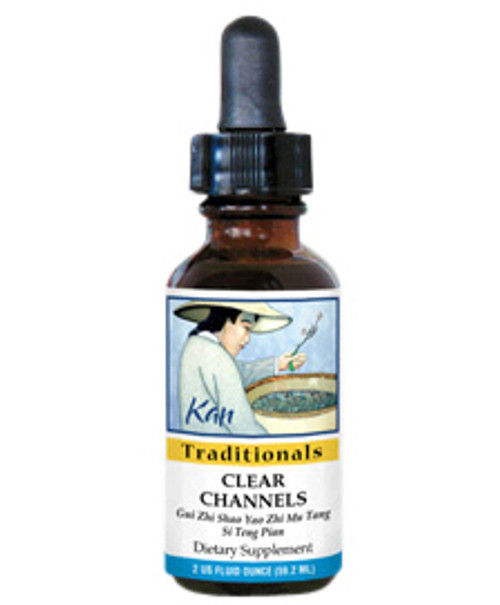Clear Channels, 2 oz
| Unit Size | 2 fl oz. dropper bottle |
| Potency | 7:1 |
| Properties | Supports healthy joints and tendons |
| Chinese Symptomology | Occasional dizziness and pressure; Occasional joint discomfort that gets worse in cold weather |
| Actions | Dispels Wind and Dampness, eliminates Heat, and relieves pain |
| Pattern | Wind-Cold-Damp impediment transforming to Heat in the interior |
| Tongue | Tongue body reddish/variable, white or yellow greasy coat |
| Pulse | Slippery, wiry, and rapid |
| Branch | Kidney, Liver, Spleen |
| Recommendations | |
| Chinese name | Gui Zhi Shao Yao Zhi Mu Tang |
| English name | Clear Channels, 2 oz |
Description
Clear Channels is indicated for a chronic condition of Wind-Cold-Damp painful obstruction, which over time has transformed into Heat and caused swelling and pain in the joints. When the pernicious influences of Wind and Dampness have settled in the body, they will commonly move to the lower extremities where they will cause edema and joint pain. This Damp obstruction can also block the ascent of the clear Yang and cause such symptoms as headaches, dizziness, weight loss and a lack of appetite. One primary manifestation of this pattern is that the Heat and swelling will be worse in the evening and confined strictly to the joints, as compared to Yin vacuity symptoms, where there are more systemic Heat signs. Clear Channels has the unique addition of the "five vines" which strengthen the action of the Cinnamon and Anemarrhena combination by further expelling Wind and Damp, unblocking the channels and alleviating pain.
Ingredients
| Pinyin Name | Common Name |
|---|
| Mu gua | Chinese quince |
| Bai shao | White peony root |
| Ji xue teng | Spathlobus root and vine |
| Sang ji sheng | Loranthus twig |
| Zhi mu | Anemarrhena rhizome |
| Chi shao | Chinese red peony root |
| Gui zhi | Chinese cinnamon twig |
| Hai feng teng | Kadsura pepper vine |
| Kuan jin teng | Chinese tinospora stem |
| Luo shi teng | Star jasmine stem |
| Sang zhi | White mulberry twig |
| Ren dong teng | Lonicera stem |
| Ye jiao teng | Polygonum multiflorum stem |
| Gan cao | Chinese licorice root |











